We may not have the course you’re looking for. If you enquire or give us a call on + 1-866 272 8822 and speak to our training experts, we may still be able to help with your training requirements.
Training Outcomes Within Your Budget!
We ensure quality, budget-alignment, and timely delivery by our expert instructors.
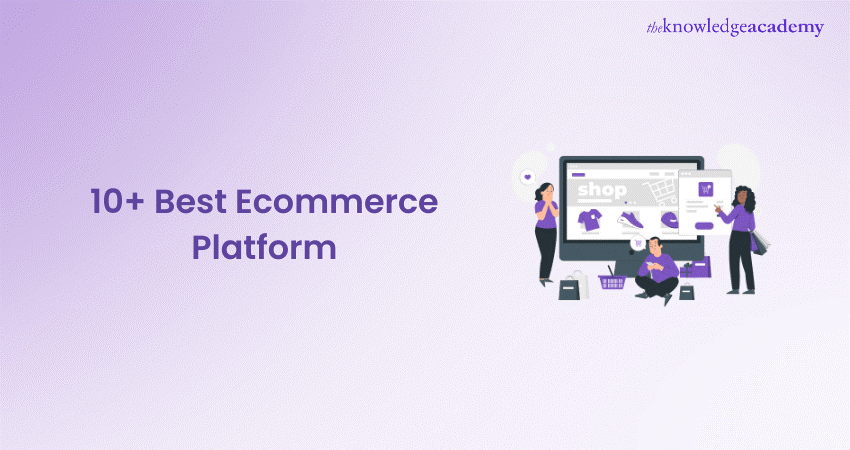
Struggling to find the ideal Ecommerce Platform? With countless options vying for your attention, selecting the Best Ecommerce Platform can feel like navigating through a maze. Each platform promises to be the key to unlocking your business's potential, but how do you find the one that truly aligns with your goals?
In this blog, we’ll explore the mysteries of the top Ecommerce Platforms, breaking down what makes each one tick. From user-friendly designs to robust customisation and scalability, we’ve got you covered. Ready to discover the Best Ecommerce Platform that will turn your online business vision into reality? Let’s dive in and find the perfect platform for your success!
Table of Contents
1) Understanding Ecommerce Platforms
a) Wix
b) Shopify
c) BigCommerce
d) Squarespace
e) Shift4Shop
f) Ecwid
g) OpenCart
h) Magento
i) WooCommerce
j) Big Cartel
2) Top Ecommerce Platforms to Consider
3) Selecting an Ecommerce Platform: Aligning with Business Requirements
4) Conclusion
Understanding Ecommerce Platforms
An Ecommerce Platform is software that allows businesses to build and manage their online store. From showcasing products and handling payments to managing shipping and inventory, these platforms serve as the backbone of your online business. They provide you with the tools to create a seamless shopping experience for your customers while ensuring that your back-end operations run smoothly.
The right Ecommerce Platform can make all the difference in how your business operates and scales. It affects everything from website speed to customer satisfaction, so choosing wisely is essential. The following sections will introduce you to some of the Best Ecommerce Platforms, highlighting their unique features and who they're best suited for.
Top Ecommerce Platforms to Consider
When selecting an Ecommerce Platform, it's important to consider factors such as ease of use, customisation options, payment gateway integration, and customer support. Let's dive into the top Ecommerce Platforms that you should consider for your online store.
1) Wix
Overview:
Wix is a versatile platform known for its drag-and-drop website builder, making it a popular choice for beginners. It offers a range of Ecommerce features that allow you to create a fully functional online store without any coding knowledge.
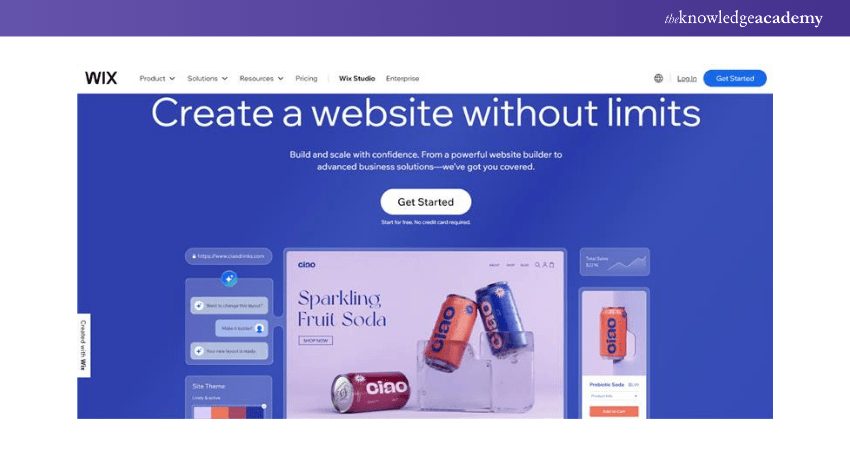
Key Features:
a) Drag-and-drop editor
b) Customisable templates
c) Integrated payment options
d) Mobile-optimised sites
e) SEO tools
Pros:
a) User-friendly interface
b) Affordable pricing
c) Wide range of design templates
Cons:
a) Limited scalability for larger businesses
b) Limited advanced features compared to other platforms
Best For:
Small businesses and beginners who want an easy-to-use platform to get started quickly.
2) Shopify
Overview:
Shopify is one of the Best Ecommerce Platforms globally, known for its robust features and scalability. It caters to businesses of all sizes, from small startups to large enterprises, offering a wide range of tools to build and grow an online store.

Key Features:
a) Customisable themes
b) Multiple payment gateways
c) Integrated POS system
d) Extensive app marketplace
e) 24/7 customer support
Pros:
a) Highly scalable
b) Excellent customer support
c) Seamless integration with third-party apps
Cons:
a) Transaction fees on certain payment gateways
b) Limited customisation options without coding
Best For:
Businesses are looking for a reliable and scalable platform with a wide range of features.
Explore Shopify's features and build your online presence with expert guidance in our Introduction To Shopify – join now!
3) BigCommerce
Overview:
BigCommerce is a powerful Ecommerce Platform designed for growing businesses. It offers a wide range of built-in features, allowing businesses to scale without the need for third-party apps. BigCommerce is particularly strong in SEO and multi-channel selling.
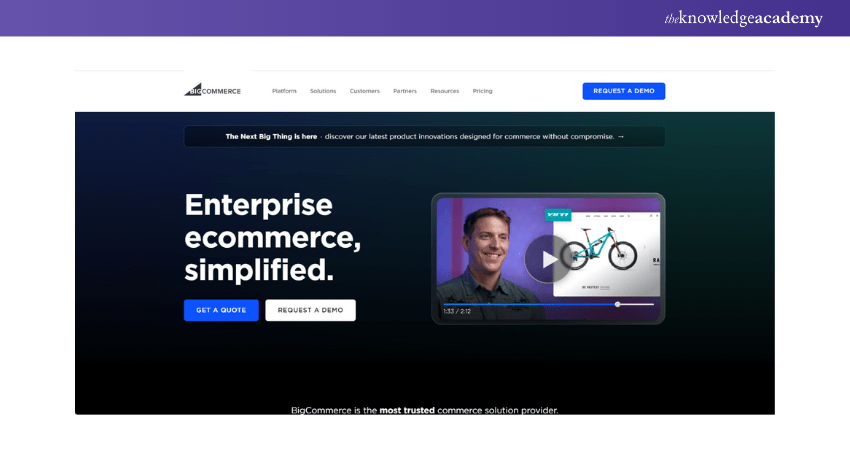
Key Features:
a) No transaction fees
b) Multi-channel selling
c) Advanced SEO tools
d) Built-in marketing tools
e) Customisable templates
Pros:
a) No transaction fees
b) Robust SEO capabilities
c) Scalable for growing businesses
Cons:
a) Higher learning curve
b) Expensive compared to other platforms
Best For:
Businesses that are focused on growth and want a platform that can scale with them.
4) Squarespace
Overview:
Squarespace is known for its stunning design templates and is a popular choice among creatives and artists. While it started as a website builder, it has expanded its Ecommerce capabilities, making it a solid choice for small businesses and entrepreneurs.
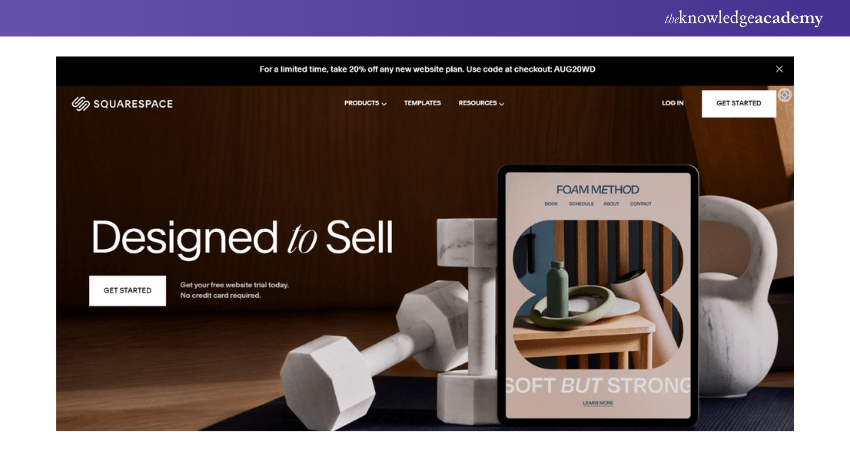
Key Features:
a) Beautiful design templates
b) Integrated Ecommerce tools
c) Blogging platform
d) Mobile-optimised designs
e) SSL security
Pros:
a) Visually appealing templates
b) Easy to use
c) All-in-one platform (Ecommerce, blogging, and hosting)
Cons:
a) Limited payment options
b) Not as feature-rich as other platforms
Best For:
Creatives and small businesses that prioritise design and aesthetics.
5) Shift4Shop
Overview:
Shift4Shop, formerly known as 3dcart, is a robust Ecommerce Platform offering a comprehensive set of tools for online store owners. It provides strong SEO capabilities, Customisable templates, and a range of built-in features to help businesses grow.
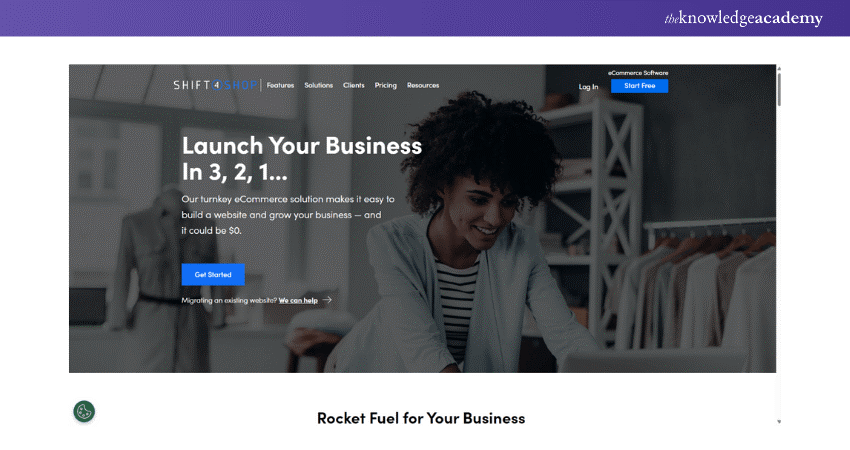
Key Features:
a) Unlimited product listings
b) Built-in CRM and marketing tools
c) Mobile-ready themes
d) No transaction fees
e) Advanced SEO tools
Pros:
a) Extensive built-in features
b) No transaction fees
c) Strong SEO capabilities
Cons:
a) Outdated interface
b) Steeper learning curve
Best For:
Small to medium-sized businesses that need a feature-rich platform with no transaction fees.
6) Ecwid
Overview:
Ecwid is a flexible Ecommerce solution that allows you to add an online store to any existing website. It integrates seamlessly with various content management systems, making it a great option for those who already have a website and want to add Ecommerce functionality.
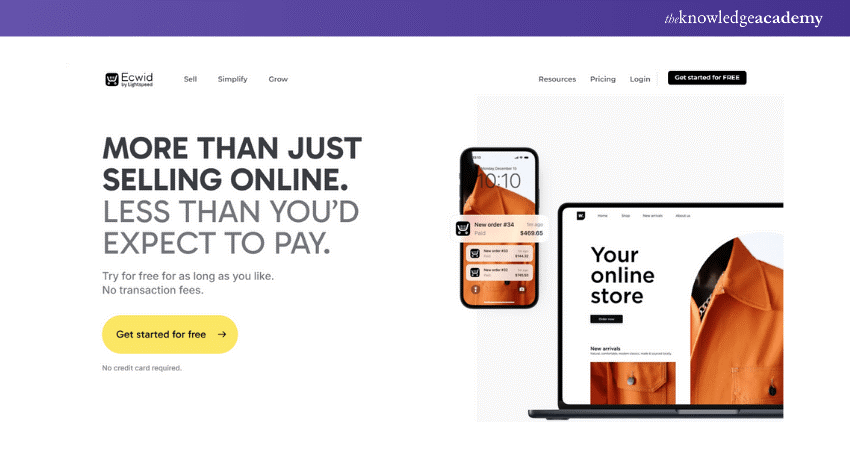
Key Features:
a) Easy integration with existing websites
b) Multi-channel selling
c) Mobile-friendly design
d) Automated tax calculations
e) Secure payment options
Pros:
a) Affordable pricing
b) Easy to integrate with existing sites
c) Supports multiple sales channels
Cons:
a) Limited Customisation options
c) Requires a separate website to function
Best For:
Businesses that already have a website and want to add Ecommerce functionality without building a new site.
7) OpenCart
Overview:
OpenCart is an open-source Ecommerce Platform that offers a highly Customisable and scalable solution for businesses. It’s free to use, but you may need to invest in extensions and hosting, making it a good option for tech-savvy entrepreneurs.
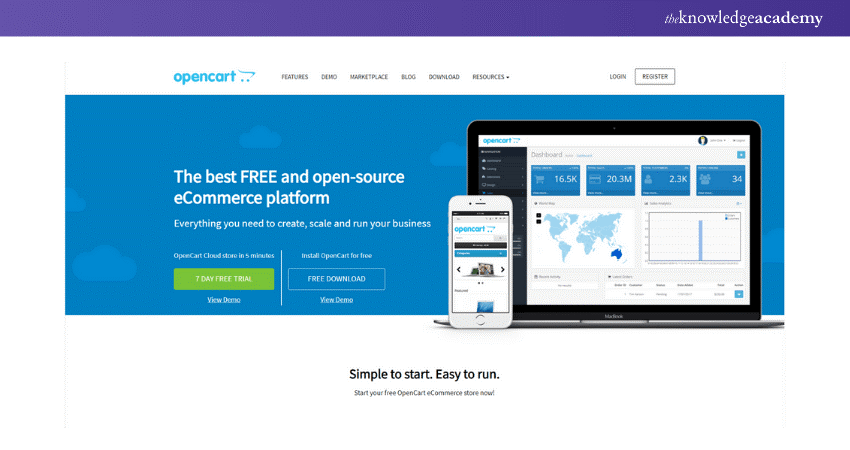
Key Features:
a) Open-source and free-to-use
b) Multi-store management
c) Extensive extensions marketplace
d) Multiple payment gateways
e) SEO-friendly features
Pros:
a) Highly Customisable
b) Cost-effective (only pay for extensions and hosting)
c) Strong community support
Cons:
a) Requires technical knowledge
b) Limited support
Best For:
Tech-savvy entrepreneurs and businesses looking for a Customisable and cost-effective solution.
8) Magento
Overview:
Magento, now part of Adobe Commerce, is one of the most powerful and flexible Ecommerce Platforms available. It offers extensive Customisation options and is best suited for large businesses with complex needs and the resources to manage a robust Ecommerce operation.
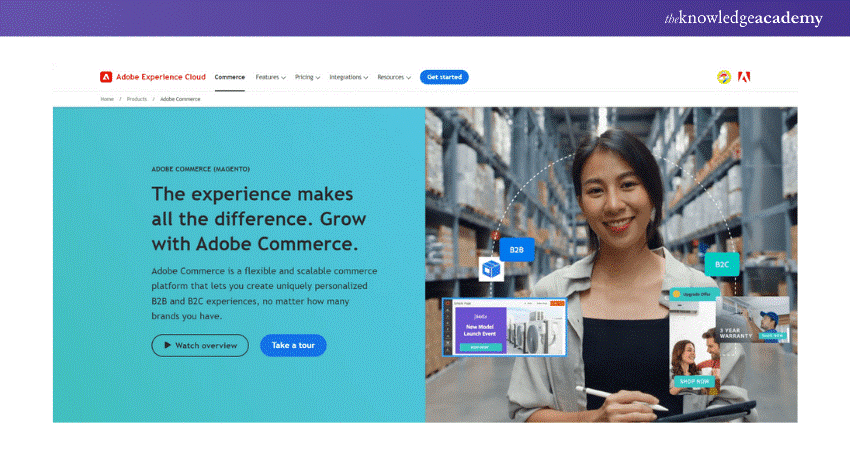
Key Features:
a) Highly Customisable
b) Advanced SEO features
c) Multi-store capabilities
d) Extensive third-party integrations
e) Strong security features
Pros:
a) Endless Customisation possibilities
b) Strong SEO and marketing tools
c) Scalable for large businesses
Cons:
a) Requires technical expertise
b) High cost of development and maintenance
Best For:
Large businesses with complex needs and the resources to manage a robust Ecommerce Platform.
Unlock the power of Magento – start your Magento Training today and transform your ecommerce skills!
9) WooCommerce
Overview:
WooCommerce is a popular Ecommerce plugin for WordPress, offering extensive Customisation options and flexibility. It’s a great choice for those already familiar with WordPress and looking to add Ecommerce functionality to their website.
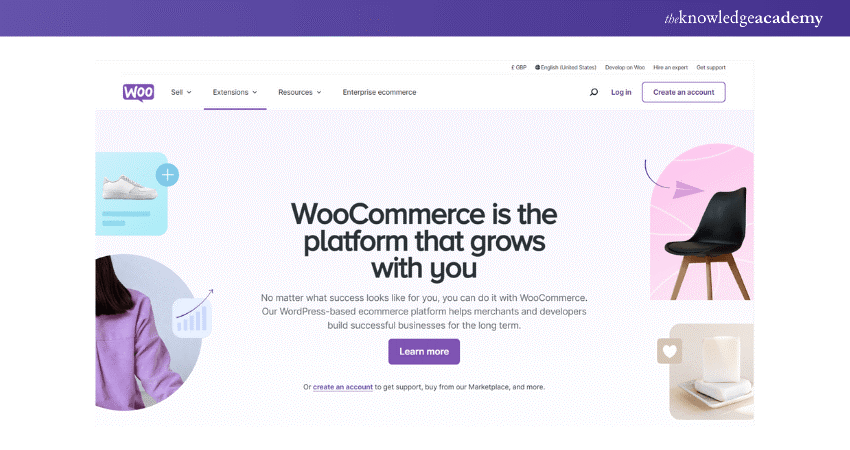
Key Features:
a) Seamless integration with WordPress
b) Extensive theme and plugin library
c) Flexible and Customisable
d) Multiple payment gateways
e) SEO-friendly
Pros:
a) Highly flexible and Customisable
b) Strong integration with WordPress
c) Large community and extensive resources
Cons:
a) Requires WordPress knowledge
b) It can become costly with extensions
Best For:
Businesses already using WordPress want to add Ecommerce capabilities.
Learn to build, manage, and optimise your WooCommerce store with our comprehensive, hands-on WooCommerce Training – sign up now!
10) Big Cartel
Overview:
Big Cartel is a platform designed for artists, makers, and small businesses. It’s simple, affordable, and offers a minimalist approach to Ecommerce, making it a popular choice for creatives looking to sell their work online.
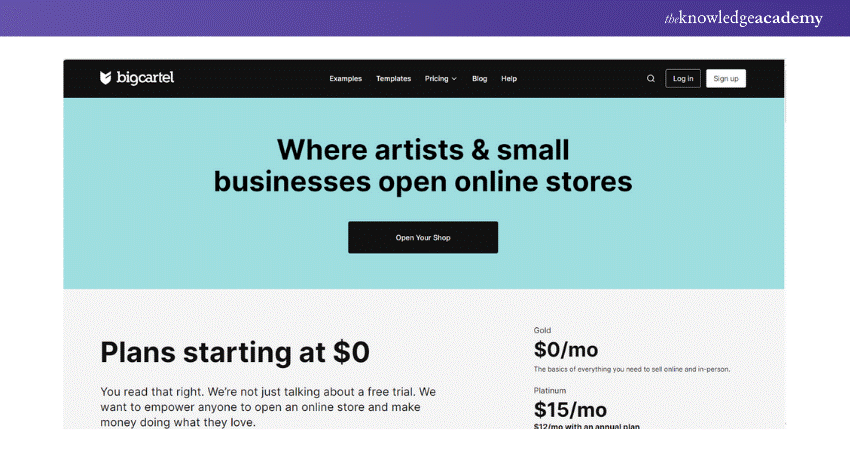
Key Features:
a) Simple and easy to use
b) Customisable themes
c) No listing fees
d) Built-in SEO tools
e) Mobile-friendly
Pros:
a) Affordable pricing
b) Easy to set up and use
c) No listing fees
Cons:
a) Limited scalability
b) Basic feature set
Best For:
Artists, makers, and small businesses are looking for a simple, affordable platform to sell their work online.
11) Sellfy
Overview:
Sellfy is an one of the Best Ecommerce Platforms tailored for digital products, making it an excellent choice for creators selling eBooks, music, videos, and other digital goods. It offers a straightforward setup process and a range of tools to help you sell online.
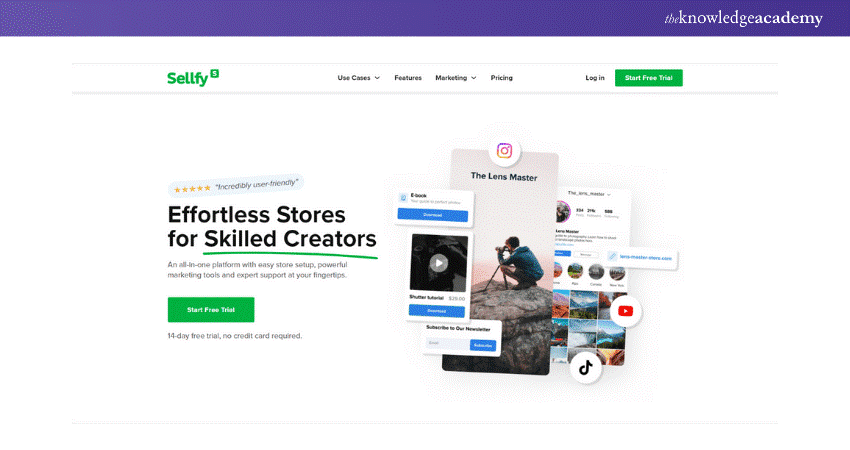
Key Features:
a) Optimised for digital products
b) Built-in marketing tools
c) Subscription billing options
d) Embeddable buy buttons
e) Custom domain support
Pros:
a) Ideal for digital products
b) Easy to use
c) Subscription billing options
Cons:
a) Limited physical product features
b) Basic Customisation options
Best For:
Creators selling digital products, such as eBooks, music, or videos.
12) Volusion
Overview:
Volusion is an all-in-one Ecommerce Platform that provides a range of tools for building and managing an online store. It’s designed for small to medium-sized businesses and offers a user-friendly interface with strong customer support.
Key Features:
a) Drag-and-drop website builder
b) Built-in SEO and marketing tools
c) Inventory management
d) Secure payment processing
e) Mobile-optimised designs
Pros:
a) User-friendly interface
b) Strong customer support
c) Good inventory management tools
Cons:
a) Limited scalability
b) Higher transaction fees on lower plans
Best For:
Small to medium-sized businesses looking for a user-friendly platform
13) Yo!Kart
Overview:
Yo!Kart is a multivendor Ecommerce Platform designed for businesses looking to create a marketplace similar to Amazon or eBay. It’s a robust and scalable solution that allows multiple vendors to sell their products on your platform.
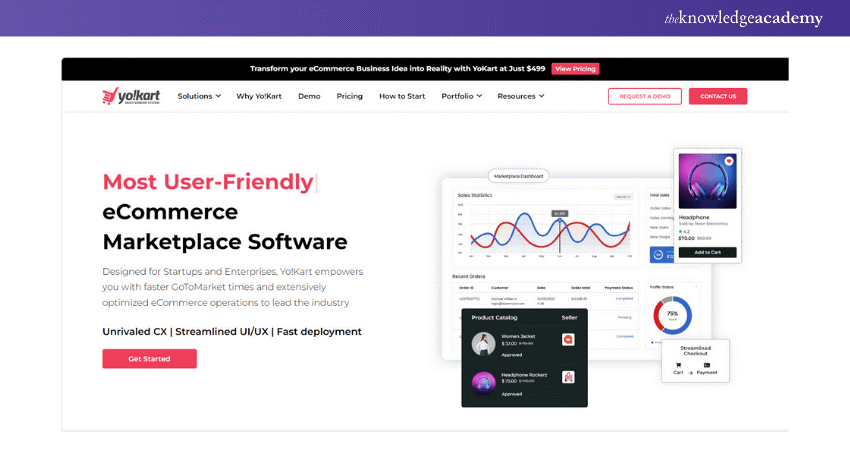
Key Features:
a) Multivendor capabilities
b) Customisable storefronts
c) Secure payment gateways
d) Mobile apps for Android and iOS
e) Advanced analytics and reporting
Pros:
a) Supports multiple vendors
b) Scalable for large marketplaces
c) Strong security features
Cons:
a) Requires technical expertise
b) Higher initial setup cost
Best For:
Businesses looking to create a multivendor marketplace.
Elevate your brand with advanced digital marketing tools with our Digital Marketing Tools Training – join now!
Selecting an Ecommerce Platform: Aligning with Business Requirements
Choosing the right Ecommerce Platform is not just about picking the one with the most features or the lowest price. It’s about finding the platform that best aligns with your business requirements, goals, and resources. Here are some key considerations to keep in mind when selecting an Ecommerce Platform:
1) Scalability and Performance
Ensure the platform can handle your business growth without compromising performance. As your customer base and order volume increase, the platform should seamlessly accommodate higher demands.
2) Customisation Capabilities
Look for a platform that offers extensive Customisation options. This allows you to tailor the user interface, product catalogues, pricing structures, and workflows to match your specific business needs.
3) Integration with ERP and CRM Systems
Efficient integration with your existing Enterprise Resource Planning (ERP) and Customer Relationship Management (CRM) systems is crucial. This ensures real-time updates on inventory, pricing, customer data, and order information, streamlining processes and reducing manual errors.
4) Security and Compliance
Choose a platform that complies with industry standards and offers robust security features, such as SSL encryption, data backups, and PCI DSS compliance, to safeguard your business and customer data.
5) User-Friendly Interface
A user-friendly interface is critical for providing a seamless and intuitive shopping experience. The platform should be easy to navigate, with clear product categorisation, advanced search options, and a streamlined checkout process.
6) Flexible Payment Options
Flexible payment options prioritise customer convenience, accommodate diverse business needs, and streamline the transaction process.
7) Unified B2B and B2C Selling
If you sell to both businesses and individual consumers, a combined B2B and B2C platform simplifies operations by providing a single interface for managing customer relationships.
8) Customer Support and Training
Reliable customer support and training resources are vital, especially during the initial setup and ongoing usage of the platform.
9) Pricing and Licensing Model
Consider the pricing and licensing model of the Ecommerce Platform. Analyse your business’s financials and choose a pricing structure that aligns with your budget and anticipated sales volume.
Unlock the secrets to Ecommerce success with our Ecommerce Strategy Course and elevate your digital business strategy today!
Conclusion
Selecting the Best Ecommerce Platform is more than just a decision—it's the foundation of your online success. By matching your business needs with the right platform, you set the stage for growth, innovation, and a thriving online presence. Choose wisely and watch your store flourish!
Transform your career with cutting-edge Digital Marketing Courses that provide practical skills and real-world expertise!
Frequently Asked Questions

The most secure Ecommerce Platform is generally considered to be Magento (Adobe Commerce). It is known for its robust security features, including regular updates, strong encryption, and extensive Customisation options to enhance security.

Shopify is widely regarded as the best platform for Ecommerce ads. It offers seamless integration with major ad platforms like Facebook, Google, and Instagram. This makes it easy to manage and optimise campaigns.

The Knowledge Academy takes global learning to new heights, offering over 30,000 online courses across 490+ locations in 220 countries. This expansive reach ensures accessibility and convenience for learners worldwide.
Alongside our diverse Online Course Catalogue, encompassing 19 major categories, we go the extra mile by providing a plethora of free educational Online Resources like News updates, Blogs, videos, webinars, and interview questions. Tailoring learning experiences further, professionals can maximise value with customisable Course Bundles of TKA.

The Knowledge Academy’s Knowledge Pass, a prepaid voucher, adds another layer of flexibility, allowing course bookings over a 12-month period. Join us on a journey where education knows no bounds.

The Knowledge Academy offers various Digital Marketing Courses, including Ecommerce Strategy Course, Certified Artificial Intelligence (AI) for Digital Marketing Training, Product Content for Ecommerce Training and Pinterest Marketing Course. These courses cater to different skill levels, providing comprehensive insights into Dropshipping Tips.
Our Digital Marketing Blogs cover a range of topics related to Ecommerce, offering valuable resources, best practices, and industry insights. Whether you are a beginner or looking to advance your Digital Marketing skills, The Knowledge Academy's diverse courses and informative blogs have got you covered.
Upcoming Digital Marketing Resources Batches & Dates
Date
 Ecommerce Strategy Course
Ecommerce Strategy Course
Fri 17th Jan 2025
Fri 21st Feb 2025
Fri 4th Apr 2025
Fri 6th Jun 2025
Fri 25th Jul 2025
Fri 7th Nov 2025
Fri 26th Dec 2025







 Top Rated Course
Top Rated Course



 If you wish to make any changes to your course, please
If you wish to make any changes to your course, please


